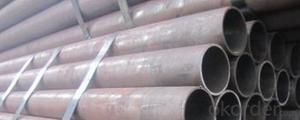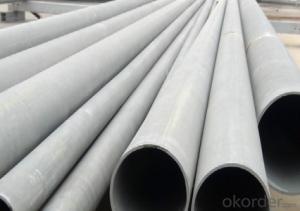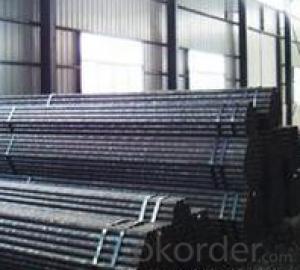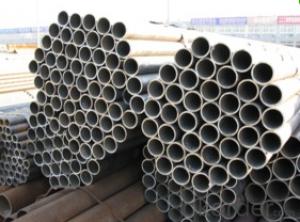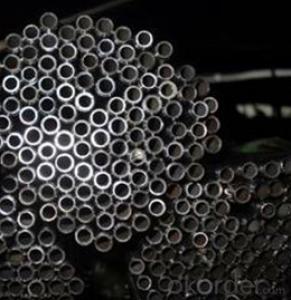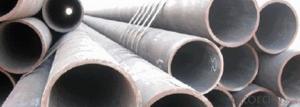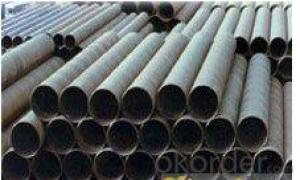Schedule 40 Seamless Carbon Steel Pipe 12Cr1MoVG CNBM
- Loading Port:
- Qingdao
- Payment Terms:
- TT OR LC
- Min Order Qty:
- 10 pc
- Supply Capability:
- 30 pc/month
OKorder Service Pledge
OKorder Financial Service
You Might Also Like
Quick Details
| Thickness: | 1.73 - 59.54 mm | Section Shape: | Round | Outer Diameter: | 10.3 - 914.4 mm |
| Secondary Or Not: | Non-secondary | Application: | Fluid Pipe | ||
| Technique: | Hot Rolled | Certification: | API | Surface Treatment: | Galvanized,vanish covering, black painting, galvenized ect. |
| Special Pipe: | API Pipe | Alloy Or Not: | Non-alloy | Length: | 5-12m as per customer's requirements |
| SCH: | SCH10~160, STD, XS & XXS | Payment Terms: | L/C T/T | Supply Ability: | 5000 Ton/Tons per Week |
| Product: | pipe prices | Grade: | 10#,20#,45#,A106(B,C),A53(A,B),12Cr1MoV,12Cr1MoVG,12Cr2Mo,13CrMo44,13CrMo45,15CrMo,15CrMoG,St52,St52.4,10#-45#,A53-A369,Cr-Mo alloy,ST35-ST52 | Standard: | API 5CT,API 5L,ASTM A106-2006,ASTM A53-2007,DIN 17175,GB 3087-1999,GB 5130,GB 6479-2000,GB 9948-2006,GB/T 17396-1998,GB/T 5312-1999,GB/T 8162-1999,GB/T 8163-1999,API,ASTM,DIN,GB |
Packaging & Delivery
| Packaging Detail: | By bundles, seaworthy wooden cases, steel framed cases, and simple packaging or according to the demand of the customers. |
| Delivery Detail: | within 5-15 days |
Specifications
1.pipe prices
2.Supply Ability:5000 Tons per Week
3.Payment Terms:L/C T/T
High quality Carbon steel pipe, Best pipe prices
1) Application: Overheat pipe for low and mediumpressure boiler,boiling water pipe, locomotive smoke pipe(big and small),Carry gas ,water or oil in the industries of petroleum and natural gas etc
2) Materials: 10#, 20#, 45#, 15CrMo, 12Cr1MoV, 13CrMo44, 12Cr2Mo, 13CrMo45, 12Cr1MoVG, 15CrMoG, API J55, API K55, API N80, API L80, API P110
3)Pipe according to standard: GB 3087-1999, GB/T 8163-1999, GB/T 8162-1999, GB 9948-2006, GB/T 17396-1998, GB/T 5312-1999, GB 6479-2000, GB 5130, DIN 17175, API 5CT, API 5L .
4)Packing: By bundles, seaworthy wooden cases, steel framed cases, and simple packaging or according to the demand of the customers.
Technical Parameters of Seamless Steel Pipe
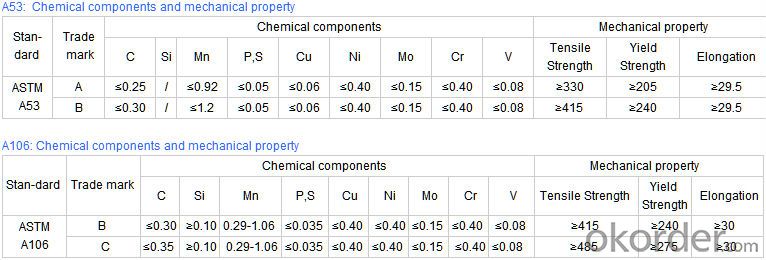
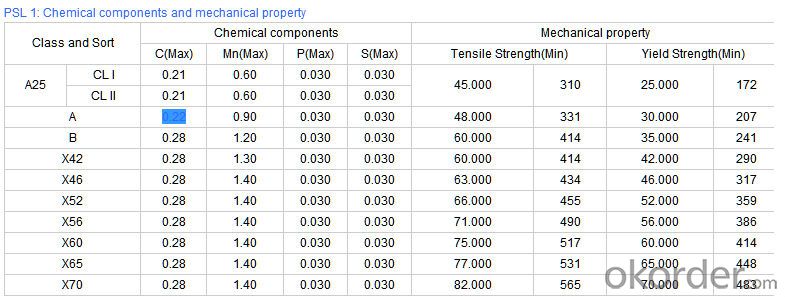
- Q: How do steel pipes perform in corrosive environments?
- Steel pipes perform well in corrosive environments due to their high resistance to corrosion. They are commonly used in industries such as oil and gas, chemical processing, and wastewater treatment where exposure to corrosive substances is prevalent. The protective oxide layer on the surface of steel pipes prevents the material from getting corroded, ensuring long-term durability and reliability. Additionally, steel pipes can be further protected by coatings or linings to enhance their resistance to corrosion in highly aggressive environments.
- Q: What is the average lifespan of a steel pipe?
- The average lifespan of a steel pipe can vary depending on various factors such as its quality, usage conditions, maintenance, and exposure to external factors. However, on average, a properly installed and maintained steel pipe can last anywhere from 20 to 100 years or more.
- Q: Can steel pipes be used for wastewater treatment systems?
- Yes, steel pipes can be used for wastewater treatment systems. Steel pipes are commonly used in wastewater treatment systems due to their durability, strength, and resistance to corrosion. They are able to withstand the harsh conditions and chemicals present in wastewater treatment processes, making them a reliable choice for transporting and distributing wastewater within the system.
- Q: What are the advantages of using steel pipes in the manufacturing of appliances?
- There are several advantages of using steel pipes in the manufacturing of appliances. Firstly, steel pipes offer high strength and durability, making them ideal for handling heavy loads and withstanding harsh conditions. Secondly, steel pipes have excellent corrosion resistance, ensuring longevity and preventing damage from exposure to moisture or chemicals. Furthermore, steel pipes provide a smooth interior surface, promoting efficient flow of liquids or gases within the appliances. Lastly, steel pipes are recyclable, making them a sustainable choice and contributing to environmental conservation.
- Q: What is the difference between steel pipes and FRP pipes?
- Steel pipes and FRP (Fiber Reinforced Plastic) pipes are two different types of pipes that are commonly used in various industries and applications. Here are the key differences between the two: 1. Material Composition: Steel pipes are made of steel, which is an alloy of iron and carbon, with additional elements like manganese, silicon, and traces of other metals. On the other hand, FRP pipes are composed of a polymer matrix reinforced with fibers, such as glass or carbon fibers. 2. Strength and Durability: Steel pipes are known for their high strength and durability. They can withstand high pressures, heavy loads, and extreme temperatures. FRP pipes, although strong and durable, are comparatively lighter in weight and may not have the same level of strength as steel pipes. However, they are corrosion-resistant and have a longer lifespan in corrosive environments. 3. Corrosion Resistance: Steel pipes are prone to corrosion and require protective coatings or linings to prevent rust and deterioration. FRP pipes, on the other hand, are inherently corrosion-resistant. They do not require additional coatings and are suitable for transporting corrosive fluids or operating in corrosive environments. 4. Installation and Maintenance: Steel pipes require specialized welding or threading techniques for installation. They can be more labor-intensive and time-consuming to install, especially in complex or large-scale projects. FRP pipes, on the other hand, are lightweight and can be easily transported and installed. They often come in pre-fabricated sections, making installation faster and less labor-intensive. Additionally, FRP pipes require minimal maintenance compared to steel pipes. 5. Cost: Steel pipes are generally more expensive than FRP pipes due to the higher cost of raw materials and the need for additional corrosion protection measures. FRP pipes offer a cost-effective alternative, especially in applications where corrosion resistance is essential, as they eliminate the need for expensive coatings or linings. Overall, the choice between steel pipes and FRP pipes depends on the specific requirements of the application. Steel pipes are preferred for their high strength, while FRP pipes offer benefits such as corrosion resistance, lightweight, and cost-effectiveness.
- Q: What is ND steel pipe?
- ND steel also has the ability to resist chloride ion corrosion. ND steel pipe, the main reference indicators (70 degrees Celsius, 50%H2SO4 solution immersion 24 hours), and carbon steel, Japan imported similar steel, stainless steel corrosion resistance compared to higher than these steel grades. Products by domestic refineries and manufacturing units after the use of widely acclaimed, and achieved good results.
- Q: How to distinguish seamless pipe and welded pipe?
- If there is a weld seam in the fracture surface, whether it is inside or outside the pipe, then it is the welded pipe
- Q: How are steel pipes used in the manufacturing of machinery?
- Steel pipes are commonly used in the manufacturing of machinery for various purposes such as conveying fluids, gases, or solids, and providing structural support. They are used to transport materials within the machinery, including coolant, lubricants, and gases. Steel pipes also play a crucial role in creating the framework or structure of machinery, providing stability and strength. Additionally, they are used for creating pneumatic systems, hydraulic systems, and exhaust systems in machinery.
- Q: What are the different methods of cutting steel pipes?
- There are several methods of cutting steel pipes, including manual methods such as hacksawing and pipe cutters, as well as more advanced methods like plasma cutting, oxy-fuel cutting, and bandsaw cutting. Each method has its own advantages and suitability depending on the specific requirements of the project.
- Q: How are steel pipes used in the construction of underground parking garages?
- Steel pipes are commonly used in the construction of underground parking garages for various purposes such as drainage, ventilation, and structural support. They are used as conduits for underground utilities, including water supply and sewage systems. Additionally, steel pipes are often used as piling or foundation elements to provide stability and support to the structure, especially in areas with challenging soil conditions. Overall, steel pipes play a crucial role in ensuring the functionality and durability of underground parking garages.
Send your message to us
Schedule 40 Seamless Carbon Steel Pipe 12Cr1MoVG CNBM
- Loading Port:
- Qingdao
- Payment Terms:
- TT OR LC
- Min Order Qty:
- 10 pc
- Supply Capability:
- 30 pc/month
OKorder Service Pledge
OKorder Financial Service
Similar products
Hot products
Hot Searches
Related keywords
